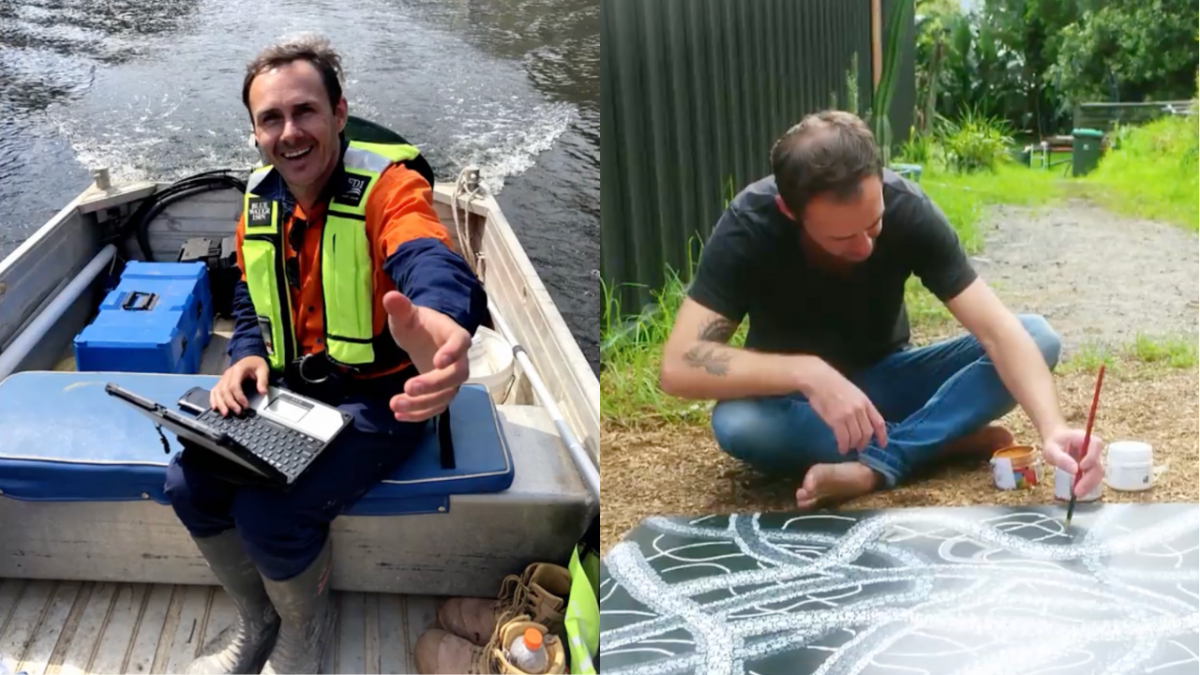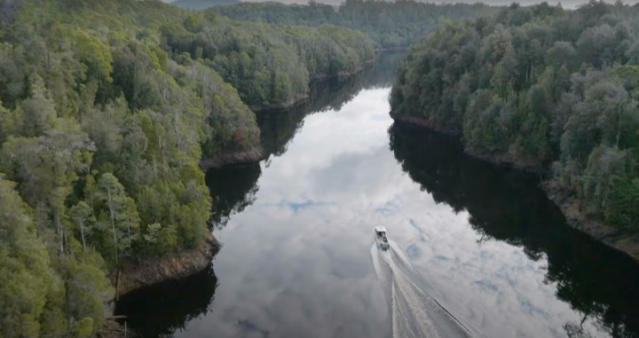
Comprised of isolated islands surrounded by murky creeks, which become drenched with misty rain in the day and blanketed with freezing Arctic air at night, the corner of lutruwita (Tasmania) that SBS’ Alone Australia is set in might seem intimidating and hostile — but for Duane Byrnes, it was an irresistible chance to connect with Country, and a moving reminder of his Ancestors’ survival.
Alone Australia premiered last week and quickly proved itself to be something quite special due to the way it has deviated from other survival shows. Instead of pushing uncomfortably “terra nullius”-esque ideas of uninhabitable land that other shows (*cough* Survivor *cough*) are guilty of, Alone‘s Australian rendition placed the palawa people firmly at the centre of its story, and then made sure to cast multiple First Nations contestants, too.

If you’ve never watched Alone before, the franchise’ premise is that a bunch of people are dropped into remote wilderness and must survive by themselves. In Alone Australia‘s case, 10 people — three of whom were First Nations — were dropped into the wilds of Tasmania, with nothing but 10 carefully selected items, a handful of clothes and their wits.
There’s no camera crew, no teams, and no producers stepping in to encourage certain behaviors — just the individual (who records themselves with cameras provided by the show), and the wild.
But Duane Byrnes, a proud Aboriginal man from Dharawal country, never really felt alone — because he had his Ancestors to guide him throughout the show.
Byrnes spoke to PEDESTRIAN.TV about what it was like appearing on the show as a First Nations man, being his own Aboriginal representation on TV, and what people can sometimes forget when they think of living on Country.
This season is unique in the way it’s really made the effort to spotlight First Nations people and the palawa people specifically. What it’s like being on a show that does that?
I’m super happy with [SBS], with how out of 10 people, three of us are Aboriginal. And that’s a really, really good figure to have in TV.
We’ve all got a story to tell, and even the 10 of us had this beautiful story, background and journey to showcase.
The more we are in media and TV, I think the better it is to educate and show the rest of Australians who we are and what we do.
Was that part of the reason you applied to this season?
Yeah, it is.
I originally found out about the show through just being a crew leader on a hazard reduction burn and showing this firefighter some bushtucker in the bush. He was really appreciative of that and he said ‘You should go on this show Alone’.
I didn’t know what it was and got home and watched it with my wife and we got absolutely addicted. Then it happened I said to her if it ever comes down in Australia, I’m going to apply. And then it came out I applied and got through and yeah, when I got through I started thinking a bit deeper as to you know, ‘Jeez this is an awesome opportunity. What am I going to get out of this?’
And I just thought ‘You know what, let’s let’s just tell, you know, my family’s story here. Let me kind of just be on feet and connect with, you know, the chosen land that we’re put on and see how I feel about that’.
How deadly to see three First Nations contestants on Alone Australia 🙌🏾👏🏽 🖤💛❤️
Good luck to Beck, Duane and Rob!Alone Australia will be airing on @SBS later this year. pic.twitter.com/FtmxheKRub
— First Peoples’ Assembly of Victoria (@firstpeoplesvic) February 18, 2023
What do you think changed or impacted you the most out of the experience?
The spiritual connection.
A lot of people, when they just see me, you know, just in the street, they probably don’t think I’m very spiritual. But when I’m actually out in the bushland, I do feel super connected, I have this sense of belonging, I have this sense of — not ownership — but just to care for like, I’m one with the environment around me. And I want to make sure that every ecosystem is flourishing, really, that’s what’s me at heart. So they [the audience] will see that for me.
And I hope they also see those little things in my life that I didn’t appreciate enough, I feel I appreciate more now. Like that sense of being connected to a single person or a group of people or just community, and how important that is now and yeah, just culturally little bits and pieces.
I just feel prouder and prouder to be Aboriginal, right? Because, you know, it’s not that it was any “inhospitable” place. It made me appreciate more just how we have survived for so many thousands of years — it’s just amazing. It’s incredible.
I was thinking actually, there’s this understanding of how people have lived off this land for centuries which gives contestants the mindset on the show that ‘if they can do this, I can do this’. Do you think sometimes people forget people were living here communally, not alone?
That’s so true, yeah!
I really like the gentle, polite way Rob basically says “my ancestors would think this is a fucking stupid thing to do”. #AloneAustralia
— Jo Thornely (@jothornely) March 29, 2023
Do you think people on Alone underestimate the fact that part of the reason survival was so successful for First Nations people on this land was because of collectivism?
Yep. Yeah, no, you’re bang on, that’s exactly what I underappreciated and really got a sense of when I was out there. That’s the exact thing, the number one thing, that came to me big time.
And there were other things, like me sourcing resources I had to have to survive out there, or to get more comfortable.
I’m pretty confident in each vegetation community group around the state at least, possibly the country itself.
I had this sense of, you know, it shouldn’t be too hard to find the resources I need to make myself comfortable. But it’s hard — you don’t have all these resources around you within a 30 metre squared radius to survive, you need to travel.
And it gave me that appreciation as to why trade existed all the way across from top to bottom of this landscape. Like, it’s such a critical thing.
Well, thanks so much for talking to me Duane, I’m excited to see you on the show, I’m rooting for you!
Thanks so much for the support!
Alone Australia airs weekly on Wednesdays at 7.30pm on SBS. You can catch up on SBS On Demand.



